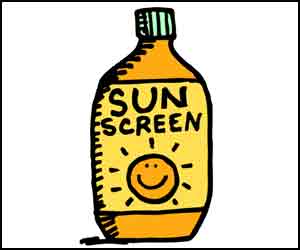- Home
- Editorial
- News
- Practice Guidelines
- Anesthesiology Guidelines
- Cancer Guidelines
- Cardiac Sciences Guidelines
- Critical Care Guidelines
- Dentistry Guidelines
- Dermatology Guidelines
- Diabetes and Endo Guidelines
- Diagnostics Guidelines
- ENT Guidelines
- Featured Practice Guidelines
- Gastroenterology Guidelines
- Geriatrics Guidelines
- Medicine Guidelines
- Nephrology Guidelines
- Neurosciences Guidelines
- Obs and Gynae Guidelines
- Ophthalmology Guidelines
- Orthopaedics Guidelines
- Paediatrics Guidelines
- Psychiatry Guidelines
- Pulmonology Guidelines
- Radiology Guidelines
- Surgery Guidelines
- Urology Guidelines
Apply sunscreen lotion generously, as benefits more than risks: AAD

Apply sunscreen lotion generously comments American Academy of Dermatology experts on a new study that has found that application of 4 commercially available sunscreens under maximal use conditions resulted in plasma concentrations that exceeded the recommended threshold by the FDA .
According to the FDA researchers, common active ingredients in sunscreen are absorbed into the blood at a level that warrants systemic safety testing on the products.The study findings have been reported in JAMA.
In the study,twenty-four healthy adults were randomized to one of four sunscreens (two sprays, one lotion, and one cream) containing various concentrations of avobenzone, oxybenzone, octocrylene, and ecamsule. Th sunscreen was applied to 75% of the body surface 4 times a day for 4 days. Participants provided 30 blood samples over 7 days.
All participants had at least 0.5 ng/mL of the active ingredients in their blood on the first day of exposure. (This is the FDA's threshold at which products should undergo nonclinical toxicology testing, including for carcinogenicity.) During the trial, concentrations rose, suggesting accumulation. The maximum concentration of plasma avobenzone — the primary outcome — ranged from 1.8–4.0 ng/mL.
The authors have recommended for additional research "to determine the clinical significance of these findings." They note: "These results do not indicate that individuals should refrain from the use of sunscreen."
According to experts at American Academy of Dermatology, the study addresses an important question about the potential for certain sunscreen ingredients to be absorbed in the bloodstream. As the study concludes, this is a small, pilot study and more research is needed before it can be determined if the absorption of sunscreen ingredients has any effects on a person’s health. These sunscreen ingredients have been used for several decades without any reported internal side effects in humans. Importantly, the study authors conclude that individuals should not refrain from the use of sunscreen, which the AAD encourages as one component of a comprehensive sun protection plan as sunscreen use has been shown to reduce the risk of skin cancer in a number of scientific studies.
Skin cancer is the most common cancer in the United States, and dermatologists see the impact it has on patients’ lives every day. Unprotected exposure to the sun’s ultraviolet rays is a major risk factor for skin cancer. The AAD encourages the public to continue to protect themselves from the sun by seeking shade; wearing protective clothing, including a lightweight, long-sleeved shirt, pants, a wide-brimmed hat and sunglasses; and generously applying a broad-spectrum, water-resistant sunscreen with an SPF of 30 or higher to exposed skin.
The AAD’s sun protection recommendations are based on the existing body of scientific evidence and current FDA regulations and guidelines; these recommendations will continue to evolve as the science develops and the FDA issues new regulations. If you are concerned about the safety of the ingredients in your sunscreen, talk to a board-certified dermatologist to develop a sun protection plan that works for you.

Disclaimer: This site is primarily intended for healthcare professionals. Any content/information on this website does not replace the advice of medical and/or health professionals and should not be construed as medical/diagnostic advice/endorsement or prescription. Use of this site is subject to our terms of use, privacy policy, advertisement policy. © 2020 Minerva Medical Treatment Pvt Ltd